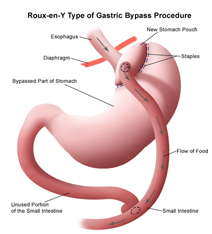Gastric Bypass Surgery in India India offers information on Gastric Bypass Surgery in India in India, Gastric Bypass Surgery in India cost India, Gastric Bypass Surgery in India hospital in India, Delhi, Mumbai, Chennai, Hyderabad & Bangalore, Gastric Bypass Surgery in India Surgeon in India
Gastric bypass (also known as a Roux-en-Y gastric bypass) is a type of weight loss surgery that works by making your stomach smaller and your digestive system shorter.
Your care will be adapted to meet your individual needs and may differ from what is described here. So it's important that you follow your surgeon's advice
About gastric bypass surgery
What are the alternatives?
Preparing for your gastric bypass operation
About the operation
What to expect afterwards
Recovering from gastric bypass surgery
What are the risks?
About gastric bypass surgery
A gastric bypass operation involves creating a small stomach pouch and bypassing part of your small intestine to make your digestive system shorter, although nothing is actually removed. This means that you can only eat small meals and your body absorbs less food.
Surgery is usually recommended only if non-surgical treatments, such as diet, exercise and medicines haven't worked.
Roux-en-Y-Gastric Bypass (Traditional and Laparoscopic) :
The Roux-en-Y bypass is more common and considered less complicated than the biliopancreatic diversion bypass, since Roux-en-Y does not remove portions of the stomach.
The traditional Roux-en-Y-gastric bypass is performed through open surgery with one long incision.
The Roux-en-Y gastric bypass can also be performed laparoscopically. The laparoscopic Roux-en-Y-gastric bypass uses multiple smaller incisions (instead of one long incision) — a laparoscopic tool is inserted, which offers a visual guide to the inside of the abdomen during the procedure.
The laparoscopic Roux-en-Y produces less scarring and lets you recover faster than the traditional Roux-en-Y-gastric bypass. But the laparoscopic approach is still new, so long-term results have not been fully evaluated.
 Biliopancreatic Diversion Bypass :
Biliopancreatic Diversion Bypass :
The biliopancreatic diversion bypass is performed through open surgery with one long incision, leaving a permanent scar. It is less common and more complicated than the Roux-en-Y-gastric bypass.
In the biliopancreatic diversion, portions of the stomach are removed and the bypass is attached to the distal illium. This procedure is not widely used, because there is more risk of nutritional deficiencies.
What are the alternatives?
An alternative surgical option is to have gastric band surgery. Your surgeon will explain your options to you.
Preparing for your gastric bypass operation
Your surgeon will explain how to prepare for your operation. For example if you smoke you will be asked to stop, as smoking increases your risk of getting a wound infection and slows your recovery.
The operation usually requires a two to four day stay in hospital and is done under general anaesthesia. This means you will be asleep during the operation.
You will be asked to follow fasting instructions. Typically you must not eat or drink for about six hours before a general anaesthetic. However, some anaesthetists allow occasional sips of water until two hours beforehand.
At the hospital your nurse may check your heart rate and blood pressure, and test your urine.
Your surgeon will usually ask you to sign a consent form. This confirms that you understand the risks, benefits and possible alternatives to the procedure and have given your permission for it to go ahead.
You may be asked to wear compression stockings to help prevent blood clots forming in the veins in your legs. You may need to have an injection of an anti-clotting medicine called heparin as well as, or instead of, stockings.
About the operation
Your surgeon will use surgical staples to create a pouch from the upper part of your stomach, separating it from the rest. A section of your small intestine is then bypassed and re-connected to the pouch. Food takes a shorter route through your digestive system, and so less food is absorbed by your body. Gastric bypass can be done using keyhole (laparoscopic) or open surgery. The operation takes between one and three hours.
Keyhole surgery
Your surgeon will make four to five small cuts on your upper abdomen. He or she will then use small instruments that are guided by a special telescope with a camera to perform the operation. Afterwards, the skin cuts are closed with several stitches.
Open surgery
A single cut (about 30cm long) is made on your upper abdomen to perform the operation. Afterwards, the skin cut is closed using stitches and staples.
What to expect afterwards
You will need to rest until the effects of the anaesthetic have passed. You may need pain relief to help with any discomfort as the anaesthetic wears off.
You may have a catheter to drain urine from your bladder into a bag. You may also have fine tubes running out from the wound. These drain fluid into another bag and are usually removed after a day or two.
You may have a tube passing through your nose to your stomach for the first day. This drains air and fluid from your stomach to stop you feeling sick and bloated.
On the first day, you may have to wear special pads, attached to an intermittent compression pump, on your lower legs. The pump inflates the pads and encourages healthy blood flow in your legs and helps to prevent deep vein thrombosis (DVT).
You will be encouraged to get out of bed and move around as this helps prevent blood clots in your legs and chest infections, and you may also have a heparin injection to prevent blood clots.
For the first 24 hours you will only be allowed to drink sips of water and after two days you will usually have an X-ray taken to check the gastric bypass is working and there are no leaks. You may be asked to swallow fluid that shows up on X-ray images. Ask your surgeon for more details about this. After this your surgeon and dietician may start you on a puréed diet for several days, although some surgeons advise a liquid diet for a longer period.
You will need to follow a strict diet and make some lifestyle changes to get the best results from your operation. Your dietician and surgeon will give you more advice about what you can and can't eat or drink and what changes you need to make.
You will usually be able to go home two to four days after your operation. You will need to arrange for someone to drive you home.
Your nurse will give you some advice about caring for your healing wounds before you go home and give you a date for a follow-up appointment.
Dissolvable stitches will disappear on their own in seven to 10 days. Non-dissolvable stitches are removed a week after surgery. The skin staples are usually taken out 12 to 14 days after surgery. Please contact the hospital if you have any concerns.
Recovering from gastric bypass surgery
If you need pain relief, you can take over-the-counter painkillers such as paracetamol or ibuprofen. Follow the instructions in the patient information leaflet that comes with the medicine and ask your pharmacist for advice.
General anaesthesia can temporarily affect your co-ordination and reasoning skills, so you should not drive, drink alcohol, operate machinery or sign legal documents for 48 hours afterwards.
Follow your surgeon's advice about driving and please contact your motor insurer so that you are aware of their recommendations. You shouldn't drive until you are confident that you could perform an emergency stop without discomfort. This is usually about two weeks after the operation.
Full recovery from a gastric bypass operation can take three to six weeks.
What are the risks?
Gastric bypass surgery is commonly performed and generally safe. However, in order to make an informed decision and give your consent, you need to be aware of the possible side-effects and the risk of complications of this procedure.
Side-effects
These are the unwanted, but mostly temporary effects of a successful treatment, for example feeling sick as a result of the general anaesthetic.
You are likely to have some bruising, pain and swelling of the skin around the healing wounds.
You may feel or be sick after eating, especially if you try to eat too much. If you eat too many sugary foods you can get an unpleasant sensation, called "dumping", which may make you feel sick or faint, or give you diarrhoea. You should drink plenty of fluids until the feelings have passed, and you should also reduce the amount of sugary foods you eat. Your restricted diet may cause some shortage of nutrients so you may need to take multivitamin tablets.
Complications
This is when problems occur during or after the operation. Most people are not affected. The possible complications of any operation include an unexpected reaction to the anaesthetic, excessive bleeding or developing a blood clot, usually in a vein in the leg (DVT).
Some of the complications you may get after a gastric bypass operation are listed here :
- Infection : antibiotics are usually given during surgery to prevent infection.
- Damage to other organs in your abdomen : you may need further surgery to repair any damage.
- Bowel leak : the point where your intestine is re-joined to your stomach pouch could leak in the first few days and you may need further surgery to repair this.
- Gallstones : there is a risk you may develop gallstones if you lose weight quickly. These can be painful and you may need surgery to remove them. Your surgeon may advise removing your gallbladder when you have your operation.
- Failure to lose weight : it's possible you may fail to lose sufficient weight or regain weight after bypass surgery.
There is a chance your surgeon may need to convert your keyhole procedure to open surgery. This means making a bigger cut on your abdomen. This is only done if it's impossible to complete the operation safely using the keyhole technique.
The exact risks are specific to you and will differ for every person, so we have not included statistics here. Ask your surgeon to explain how these risks apply to you.




